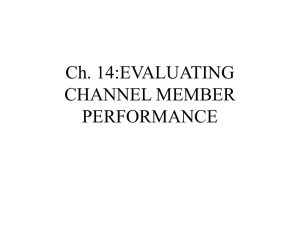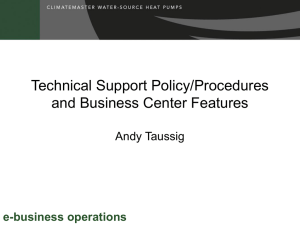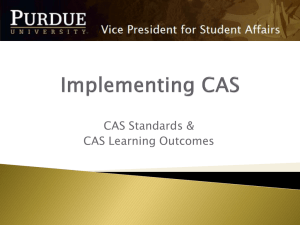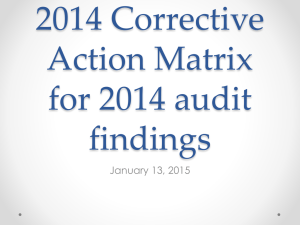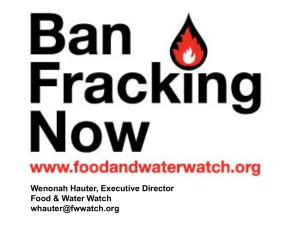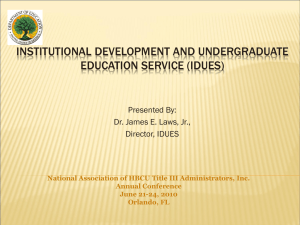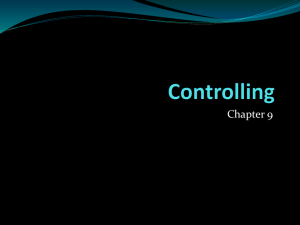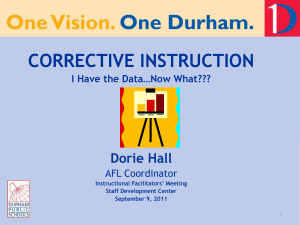Bid Protests * What We*re Fighting About This Year
advertisement
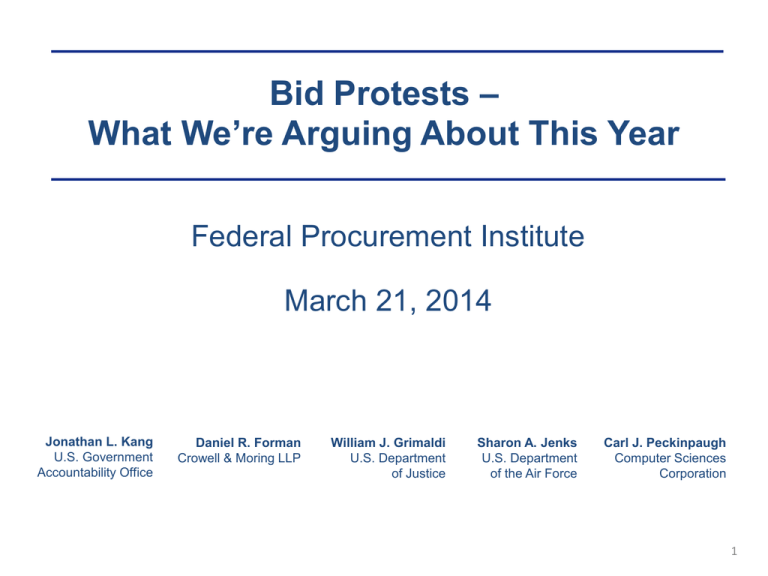
Bid Protests – What We’re Arguing About This Year Federal Procurement Institute March 21, 2014 Jonathan L. Kang U.S. Government Accountability Office Daniel R. Forman Crowell & Moring LLP William J. Grimaldi U.S. Department of Justice Sharon A. Jenks U.S. Department of the Air Force Carl J. Peckinpaugh Computer Sciences Corporation 1 Presentation Summary • Corrective action • Price realism • Waivers of organizational conflicts of interest • Other developments • Questions 2 GAO BID PROTEST STATISTICS FISCAL YEARS 2009 - 2013 FY 2013 FY 2012 FY 2011 FY 2010 FY 2010 2,429 (down 2%) 2,475 (up 5%) 2,353 (up 2%) 2,298 (up 15%) 1,989 (up 20%) Merit (Sustain + Deny) Decisions 509 570 417 441 315 Sustains 87 106 67 82 57 Sustain Rate 17% 19% 16% 18% 18% Effectiveness Rate 43% 42% 42% 42% 43% ADR (cases used) 145 106 140 159 149 ADR Success Rate 86% 80% 82% 80% 93% 4% (31 cases) 6% (56 cases) 8% (46 cases) 10% (63 cases) 12% (65 cases) Protest Filings Hearings 3 GAO Annual Bid Protest Filings FY 1985-2013 3500 3000 Protests Filed 2500 2000 1500 1000 500 4 Corrective Action at GAO • Corrective action is an important part of the GAO bid protest process. • The recent government shutdown is illustrative of the role of corrective action at GAO: • The federal government was closed for 17 days, reopened on Oct. 17, 2013. • 173 protests were filed on the 17th and 18th, which resulted in 100-day CICA due dates of Jan. 27, 2014. • Agencies took corrective action in response to approximately 50 percent of protests that were due on Jan. 27. 5 Agency Perspectives on Corrective Action Company X filed a protest, do we defend or take corrective action? 1. Is this a pre-award protest? • What is the business impact of delaying award? Do we anticipate other rounds of protest in the future (competitive range cut and/or post-award)? • Do the protest grounds just impact protester or do they impact multiple offerors • Does protester have a point? Even if we can defend, is that the right thing to do? • Do we have the documents and resources to successfully defend? • Are there other issues, not raised by protester, that should be addressed at this point? • Is corrective action fair to other offerors? If protester ends up as awardee, is the corrective action defensible? 6 Agency Perspectives on Corrective Action, continued Company X filed a protest, do we defend or take corrective action? 2. Is this a post-award protest? • Is there a mandatory stay of performance? • Did we execute an override? • If no stay, where will performance be in 100 days? • Does protester have a point? Even if we can defend, is that the right thing to do? • Do we have the documents and resources to successfully defend? (If OCI allegation, can a meaningful investigation be performed before the Agency Report is due?) • Are there other issues in the procurement that should be fixed or at least revisited? • Is the solicitation still reflective of agency needs? With task orders, are we still within the ordering period? 7 Agency Perspectives on Corrective Action, continued Company X filed a protest. We filed an agency report and GAO has held outcome prediction indicating a sustain, do we take corrective action? • • • • • Has the GAO attorney addressed all of the protest issues? Does we have confidence that other issues not indicated as a basis for a sustain will be denied in a future protest? Has the GAO attorney sufficiently explained WHY there appears to be a prejudicial error? Does the client understand the rationale? Did the GAO attorney suggest a corrective action? If so, what was it? Do we want to be able to shape the scope of corrective action? What is the likely increase in protest costs if we wait for a written decision? Is the client willing to explain a sustained protest to the head of the agency? 8 Agency Perspectives on Corrective Action, continued Scope of Corrective Action in Voluntary Notice: • Notice will likely promise the minimum, including the possibility of a new award decision, but reserve the right to take any other corrective action as deemed appropriate by the agency • More detail may be provided if we anticipate objections to the ground rules (i.e. certain aspects of the evaluation that we will not revisit, limits on discussions and proposal revisions, etc.) • When executing corrective action, always anticipate another protest • Even aspects of procurement that were defensible may be revisited and receive additional documentation • When implementing corrective action, additional issues may be uncovered and scope of corrective action may be enlarged 9 Agency Perspectives on Corrective Action, continued Sustained protest Corrective Action: • What does decision include as recommendation? • Has GAO suggested the agency relook at other aspects of the procurement, even if they were not the basis for the sustain? • If a written decision, GAO’s recommendation must be implemented in 60 days. If we want to perform additional corrective action, can we get it all done within the deadline? 10 Agency Perspectives: Trying to Get Finality History of the Light Air Support (LAS) procurement and corrective action •Oct. 29, 2010: Air Force issues a solicitation for nondevelopmental, production-ready, turboprop Light Air Support (LAS) aircraft to establish air combat capabilities for the Afghanistan Air Force •Nov. 1, 2011: Air Force issues a memorandum excluding Beechcraft from the competitive range and informing it that its proposal was considered technically unacceptable 11 Agency Perspectives: Trying to Get Finality, continued •Nov. 21, 2011: Beechcraft files a protest at GAO challenging its evaluation and exclusion from the competitive range. GAO dismissed this protest as untimely. Hawker Beechcraft Def. Company, LLC, B-406170, Dec. 22, 2011, 2011 CPD ¶ 285. •Dec. 22, 2011: Air Force awards a contract to Sierra Nevada Corporation (SNC) 12 Agency Perspectives: Trying to Get Finality, continued •Dec. 27, 2011: Beechcraft takes its protest to CoFC. Following difficulties in assembling the administrative record and review of evaluation materials suggesting possible disparate treatment, the Air Force decided to take corrective action and set aside the award to SNC, return Beechcraft to the competitive range, and accept and evaluate revised proposals. • CoFC dismissed the protest on May 7, 2012. Hawker Beechcraft Def. Co., LLC v. United States, No. 11-897C (Fed. Cl. May 7, 2012) 13 Agency Perspectives: Trying to Get Finality, continued • June 12, 2012, SNC files CoFC protest challenging the agency decision to take corrective action and the reasonableness of the corrective action itself. Corrective action proceeded during this litigation. • Other than a declaration that the agency had a duty to apply a particular aspect of the revised solicitation, CoFC eventually denied the protest on Nov. 1, 2012. Sierra Nevada Corp. v. United States, 107 Fed.Cl. 735 (2012) 14 Agency Perspectives: Trying to Get Finality, continued •Feb. 27, 2013: Air Force again awards the LAS contract to SNC •March 8, 2013: Beechcraft files a protest at GAO challenging the evaluation and new award in various ways. During the protest process, Beechcraft files two supplemental protests. •Mar. 15, 2013: Air Force overrides the mandatory CICA stay as the delivery schedule is unable to absorb additional delay •Mar. 20, 2013: Beechcraft files at CoFC to challenge the override. Following oral argument, the Court ruled from the bench on April 19, 2013 and denied the protest. Beechcraft Def. Co., LLC, V. United States, 111 Fed.Cl. 24 (2013) •Jun 13, 2013: GAO denies all of Beechcraft’s allegations. Beechcraft Def. Co., LLC, B-406170.2; B-406170.3; B-406170.4, June 13, 2013, 2013 CPD ¶ 147. 15 Corrective Action in the CoFC • Typically, before GAO, the agency determines whether corrective action is appropriate • Before the Court of Federal Claims, DOJ must approve of any proposed corrective action • 28 U.S.C. § 516: “Except as otherwise authorized by law, the conduct of litigation in which the United States, an agency, or officer thereof is a party, or is interested, and securing evidence therefor, is reserved to officers of the Department of Justice, under the direction of the Attorney General.” 16 Corrective Action in the CoFC, continued • Multiple considerations factor into the decision to undertake corrective action. For example: • The agency committed a prejudicial error when making the protested decision; • The administrative record does not contain support for the agency’s decision; or • Impact of procurement upon national security. • The United States considers similar factors when resolving all claims in the Court of Federal Claims. 17 Corrective Action in the CoFC Logistics • DOJ counsel must obtain the necessary authority to undertake corrective action. • Trial attorneys do not possess authority to undertake corrective action without approval. • The agency has the opportunity to present its opinion. • The United States files a notice of corrective action with the Court. • Notice provides plaintiff with the opportunity to accept or oppose the corrective action. 18 Corrective Action in the CoFC Logistics • Several days after the notice, the agency commences corrective action. • Once the agency commences corrective action, the United States seeks to terminate the protest. • There is no need for a Court order if the plaintiff voluntarily withdraws its protest or the parties stipulate to dismissal. See RCFC 41(a)(1)(A). • If not, the United States may move to dismiss for mootness. 19 Corrective Action in the CoFC – Mooting a Protest • Following corrective action, the Court of Federal Claims should dismiss the protest. • “[A] case is moot when the issues presented are no longer ‘live’ or the parties lack a legally cognizable interest in the outcome.” Coastal Envtl. Grp., Inc. v. United States, No. 13-71C, slip op., at 4 (Fed. Cl. Jan. 6, 2014) (citation omitted). • Mootness is derived from the Article III case or controversy requirement, but the Court of Federal Claims is an Article I court. • “Nevertheless, the Court of Federal Claims and other Article I courts traditionally have applied the ‘case or controversy’ justiciability doctrines.” Id. at 4 n.4. 20 Corrective Action in the CoFC – Mooting a Protest • Accordingly, the Court of Federal Claims has found mootness to be a question of subject matter jurisdiction. CW Gov’t Travel, Inc. v. United States, 46 Fed. Cl. 554, 556 (2000). • But see Coastal Envtl. Grp., No. 13-71C, at 5 n.6 (discussing whether a motion to dismiss for mootness should be pursuant to RCFC 12(b)(1) or 12(b)(6). • Regardless, “[w]hen, during the course of litigation, it develops that the relief sought has been granted or that the questions originally in controversy between the parties are no longer at issue, the case should generally be dismissed.” Chapman Law Firm Co. v. United States, 490 F.3d 934, 939 (Fed. Cir. 2007). 21 Litigating Corrective Action in the CoFC • The Court of Federal Claims will review proposed corrective actions. • “An arbitrary decision to take corrective action without adequate justification forces a winning contractor to participate in the process a second time and constitutes a competitive injury to that contractor.” Sys. Application & Techs. v. United States, 691 F.3d 1374, 1382 (Fed. Cir. 2012) (SA-TECH). • Challenges to a non-tentative corrective action are ripe. Id. at 1384-1385 • Such challenges are sufficiently final even if the agency has not yet issued a new award decision. Id. 22 Litigating Corrective Action in the CoFC, continued • Claims speculating that the agency will make new procurement errors in in a corrective action, however, are not ripe. See Eskridge Research Corp. v. United States, 92 Fed. Cl. 88, 94-95 (2010). • The Court is “required to assume that the Government [will] carry out the corrective action in good faith.” Id. at 95 (quoting Chapman Law Firm Co. v. United States, 490 F.3d 934, 940 (Fed. Cir. 2007)). • See also Boston Harbor Dev. Partners, LLC, 103 Fed. Cl. 499 (2012) (finding a protester lacked standing to allege an agency would be biased during a corrective action because the bias was purely conjectural and contrary to the required assumption that the agency would carry out the proposed corrective action in good faith). 23 Litigating Corrective Action in the CoFC, continued • The Court of Federal Claims will review the decision to under take corrective action under the APA arbitrary and capricious standard. See generally SA-TECH, 691 F.3d 1374. • Accordingly, the agency’s explanation for determination of its needs, here corrective action, is important. • This applies whether the agency is adopting GAO’s recommendation or undertaking unilateral corrective action. 24 Litigating Corrective Action in the CoFC, continued • The Court will find an an agency’s decision to undertake corrective action in response to a GAO recommendation to be proper unless the decision itself is irrational. Honeywell v. United States, 870 F.2d 644, 648 (Fed. Cir. 1989). • The Court may find the decision to undertake corrective action to be arbitrary if it is not narrowly tailored corrective action. Amazon Web Servs., Inc. v. United States, 113 Fed. Cl. 102 (2013). • However, an agency’s needs may change over time, requiring changes to a procurement beyond those GAO recommends. • Agencies should be careful to document its new determination of needs. 25 Advising Contractor Clients Regarding Corrective Action • Don’t be surprised if it happens • Whether protester or intervenor, early engagement of Agency counsel can be critical • From protester’s perspective, open dialogue with agency to discuss views of procurement / protest issues can alert Agency to problems not previously considered and increase chances of corrective action • From intervenor’s perspective, important to convey support in defending award and to raise potential factual/legal arguments for Agency consideration 26 Advising Contractor Clients Regarding Corrective Action, continued • Corrective action is not always a “win” for the protester (esp. if protester is not the incumbent) • Stay pending corrective action is a big issue - need express commitment from the agency • Protective Orders impair communications with client (esp. for inhouse counsel, who are scrutinized more closely than outside counsel) 27 Advocating for Contractor Clients During Corrective Action • Meaningful relief for protester generally involves reopening of discussions and/or opportunity to submit revised proposal • There are exceptions (i.e., if awardee’s proposal was non-compliant, reopening allows for cure) • Important to craft underlying protest arguments that are most likely to yield meaningful remedy if successful • Limited corrective action often results in piecemeal protest/procurement process 28 Advocating for Contractor Clients During Corrective Action, continued • If Agency decides to take corrective action, intervenor generally should try to limit to re-evaluation • Awardee’s evaluated cost/price and non-price ratings have been disclosed to disappointed offerors • If Agency does re-open, intervenor should advocate to level playing field • Agency may, but is not required, to release evaluated cost/pricing of all offerors as part of corrective action. Ocean Servs., LLC, B-292511.2, Nov. 6, 2003, 2003 CPD ¶ 206 29 Limited Corrective Action • Where an agency amends a solicitation as part of a corrective action and allows offerors to revise proposal in response, offerors may make any changes to their proposals that they care to, unless the amendment expressly limits the changes that may be made. Quest Diagnostics, Inc., B-405081.5, Dec. 19, 2012; 2013 CPD ¶ 132; Quest Diagnostics, Inc. v. United States, 110 Fed. Cl. 716 (2013). • There are circumstances where an agency reasonably may limit proposal revisions during a corrective action. Computer Assocs. Int’l, B-292077.2, Sept. 4, 2003, 2003 CPD ¶ 157. • However, where an agency amends a solicitation and allows offerors to revise proposals, the agency must permit offerors to revise any aspect of their proposals - including those that were not the subject of the amendment - unless the agency can demonstrate that the amendment cannot reasonably have an effect on other aspects of the proposal, or that allowing such revisions would be detrimental to the competitive process. Cooperative Muatori Riuniti, 30 B-294980.5, July 27, 2005, 2005 CPD ¶ 144. Limited Corrective Action, continued • Agency was required to permit offerors to submit unlimited proposal revisions where protesters argued that an amended evaluation methodology would reduce the strength of their proposals in some areas, and they should be permitted to revise other areas of their proposals to regain their competitive advantages. Lockheed Martin Sys. Integration, B-299145.5, Aug. 30, 2007, 2007 CPD ¶ 155. • Where agency amended solicitation’s past performance evaluation factor, agency was required to allow pricing and other changes as well. Power Connector, Inc., B-404916.2, Aug. 15, 2011, 2011 CPD ¶ 186. (“[W]e think that the agency should remedy the concern regarding unequal disclosures of information [disclosed in debriefings] by advising all offerors of the pricing information.” (Emphasis added.)). 31 Challenging Agency Corrective Action • At GAO, must show that the corrective action is not appropriate to remedy the concern that caused the agency to take corrective action. Jones Lang LaSalle Americas, Inc., B-406019.2, Feb. 14, 2012, 2012 CPD ¶ 98. • GAO will generally permit Agency to take limited corrective action so long as it gives protester possibility of winning. See Hyperbaric Techs., Inc., B-293047.2, Feb. 11, 2004, 2004 CPD ¶ 87. • GAO will object to an agency’s corrective action if the record establishes either that there was no impropriety in the original evaluation and award decision, or where there was an actual impropriety, but it was not prejudicial to any of the offerors. See Security Consultants Grp., Inc., B–293344.2, Mar. 19, 2004, 2004 CPD ¶ 53. 32 Challenging Agency Corrective Action, continued •COFC standard for reviewing protests of corrective action is still evolving • Sheridan Corp. v. United States, 95 Fed.Cl. 141, 151 (2010) – Court held that corrective action must target the identified defect. •Initial award made without discussions, but during protest, agency took corrective action by “enlarging competitive range” and soliciting revised proposals from three offerors even though the Solicitation remained unchanged. • Sierra Nevada Corp. v. United States, 107 Fed. Cl. 735, 750 (2012) – Court held that that corrective action must be “reasonable under the circumstances.” •Court stated that the standard set forth in Sheridan was unique to that case and should not be exported to a more nuanced case, such as this. •Unlike Sheridan, discussions had taken place and proposal revisions had been submitted, so that resolicitation as opposed to reevaluation would be viewed as reasonable in the circumstances. 33 Cost Awards with Corrective Action • Protester awarded costs associated with staffing issue on which agency took corrective action following GAO outcome prediction, but protester was not entitled to costs associated with unrelated procurement integrity issue. JV Derichebourg-BMAR & Assocs., LLCCosts, B-407562.3, May 3, 2013. • Protester awarded costs associated with a supplemental protest issue on which the agency took corrective action, but not costs associated with the original protest. Contrack Int’l, Inc.-Costs, B-401871.3, Feb. 17, 2010, 2010 CPD ¶ 122. 34 Challenging Agency’s Decision to Follow GAO Recommendation • Recent cases have placed the Court of Federal Claims (COFC) in quasi-appellate role • Turner Const. Co., Inc. v. United States, 645 F.3d 1377 (Fed. Cir. 2011) – Federal Circuit held that the Agency acts arbitrarily if it follows a GAO recommendation that is itself irrational. • CBY Design Builders v. United States, 105 Fed. Cl. 303 (2012) – Court found that GAO’s treatment of a one issue, whether offerors were mislead by the Solicitation language, was problematic and inconsistent, and that GAO’s determination that offerors were mislead lacked a rational basis. However, the Court found that GAO’s determination that the Army Corps failed to properly evaluate the proposal was rational, and therefore rational for the Agency to follow GAO’s recommendation. 35 Challenging Agency’s Decision to Follow GAO Recommendation, continued •Systems Application & Techs., Inc., v. United States, 100 Fed. Cl. 687 (2011) aff'd, 691 F.3d 1374 (Fed. Cir. 2012) – Court ruled that informal e-mail by GAO decision writing attorney suggesting the agency take corrective action was irrational because it ignored GAO’s own timeliness rules and misinterpreted the source selection memorandum. • Amazon Web Servs., Inc. v. United States, 113 Fed. Cl. 102, 105 (2013) – Court held GAO recommendation was irrational because GAO did not consider whether protester was prejudiced and therefore did not consider whether the protester had standing to bring its protest. 36 Price Realism at GAO • Realism and reasonableness are distinct concepts • The FAR does not use the term, “price realism.” Instead, FAR § 15.404-1(d)(3) provides for the application of cost realism principles to fixed-price proposals for the purpose of assessing performance risk. • GAO decisions have addressed four general principles regarding price realism 37 Price Realism Analysis at GAO -generally not required (1) If a solicitation does not provide for the evaluation of the realism of proposed prices, the agency is not required to do so. • Alamo City Eng’g Servs., Inc., B-409072, B-409072.2, Jan. 16, 2014, 2014 CPD ¶ __; see also Bannum, Inc., B-408838, Dec. 11, 2013, 2013 CPD ¶ 288 (no basis to challenge affirmative determination of responsibility based on low price) • CACI-WGI, Inc., B-408520.2, Dec. 16, 2013, 2013 CPD ¶ 293 • Network Innovations, Inc., B-408382, B- 408382.2, Sept. 4, 2013, 2013 CPD ¶ 220 • DynCorp Int’l LLC, B-407762.3, June 7, 2013, 2013 CPD ¶ 160 • PAE Gov. Servs., Inc., B-407818, Mar. 5, 2013, 2013 CPD ¶ 91 38 Price Realism Analysis at GAO -prohibited if not disclosed (2) If the solicitation does not provide for the evaluation of the realism of proposed prices, the agency must not do so • Triad Int’l Maint. Corp., B-408374, Sept. 5, 2013, 2013 CPD ¶ 208 39 Price Realism Analysis at GAO -required if soliciation provides (3) If the solicitation provides for the evaluation of the realism of proposed prices, the agency must perform an analysis. Even if the solicitation does not specifically use the term “price realism,” an analysis is required if the solicitation advises offerors that the agency will consider whether the proposed price is adequate/too low for the proposed technical approach. • Esegur -Empresa de Seguranca, SA, B-407947, B-407947.2, Apr. 26, 2013, 2013 CPD ¶ 109 • Logistics 2020, Inc., B-408543, B-408543.3, Nov. 6, 2013, 2013 CPD ¶ 258 40 Price Realism at GAO -FAR clause regarding compensation GAO decisions have noted that FAR § 52.222-46(a) requires agencies to consider whether proposed professional compensation plans are realistic. • Portfolio Mgmt. Solutions, LLC; Competitive Choice, Inc., B-408846, B-408846.4, Dec. 12, 2013, 2013 CPD ¶ 290 • Apptis Inc., B-403249, B-403249.3, Sept. 30, 2010, 2010 CPD ¶ 237 “The professional compensation proposed will be considered in terms of its impact upon recruiting and retention, its realism, and its consistency with a total plan for compensation . . . Offerors are cautioned that lowered compensation for essentially the same professional work may indicate lack of sound management judgment and lack of understanding of the requirement . . . Failure to comply with these provisions may constitute sufficient cause to justify rejection of a proposal.” FAR § 52.222-46(a). 41 Price Realism Analysis at GAO -manner/depth of evaluation (4) If the solicitation provides for the evaluation of the realism of proposed prices, the agency has discretion as to the depth and manner of the evaluation. • Harris IT Servs. Corp., B-408546.2, B-408546.3, Oct. 31, 2013, 2013 CPD ¶ 245 • Networking & Eng’g Techs., Inc., B-405062.4 et al., Sept. 4, 2013, 2013 CPD ¶ 219 • Triad Logistics Servs. Corp., B-407842.2, Apr. 22, 2013, 2013 CPD ¶ 106 • Optex Sys., Inc., B-408591, Oct. 30, 2013, 2013 CPD ¶ 244 42 Agency Perspectives on Price Realism • While there is nothing improper about an offeror submitting a below cost bid for a fixed price contract, does the agency want to deal with: • Risk of default due to contractor operating at a loss? • Repeated requests for equitable adjustments / claims? • Strained relationship with contractor? • Often used in services contracts as a check on execution risk: • Has all the equipment been accounted for? Can it really be obtained at the proposed price? • Have all the personnel been accounted for? Can they be hired and retained at the proposed rates? • Seen less often in supply procurements, but are we buying off the shelf or a developmental item or system? 43 Price Realism in the CoFC • The Court of Federal Claims must afford agencies substantial discretion in price realism evaluations. Alabama Aircraft Indus., Inc. – Birmingham v. United States, 586 F.3d 1372 (Fed. Cir. 2009) • The Federal Circuit reversed the Court of Federal Claims, which had found an agency’s price-realism analysis in a tanker maintenance procurement arbitrary when it did not expressly address the impact of the aging tankers. • “The trial court’s duty was to determine whether the agency’s pricerealism analysis was consistent with the evaluation criteria set forth in the RFP . . . not to introduce new requirements outside the scope of the RFP.” Id. at 1375-76 (internal citation omitted). 44 Price Realism in the CoFC, continued • The Court should not introduce new requirements: “The court’s attempt to rewrite the RFP . . . went beyond the scope of the court’s review, and amounted to an impermissible substitution of the court's judgment for the agency’s with regard to how the contract work should be designed.” Id. • The Federal Circuit’s treatment of price realism is consistent with the general principles underlying an APA review. 45 Price Realism Protest Challenges • Fewer avenues to attack price realism as compared with cost realism • Easier standard for Agency to satisfy • Absent failure to consider, can be difficult to win • Focus on intersection between low price and lack of technical understanding / performance risk (see DynCorp Int’l LLC, B-407762.3, June 7, 2013, 2013 CPD ¶ 160) 46 Waivers of organization conflicts of interest Two GAO cases in 2013 involved an agency’s waiver of an OCI late in the 100-day process. In both cases, GAO dismissed the argument based on the wavier, but said that the protester could subsequently challenge the waiver. Neither did at GAO. • SRA Int’l, Inc., B-407709.5, B-407709.6, Dec. 3, 2013, 2013 CPD ¶ 281 (waiver “late” in the process) • AT&T Gov. Solutions, Inc., B-407720, B-407720.2, Jan. 30, 2013, 2013 CPD ¶ 45 (waiver on day 97) SRA subsequently challenged the waiver at the Court of Federal Claims. The court in a published opinion requested that GAO address the waiver issue. • SRA Int’l, Inc. v. United States, COFC No. 13-969 C, Jan. 14, 2014. 47 OCIs in the CoFC • The Federal Circuit and Court of Federal Claims afford deference to the agency’s fact-findings and analyses regarding OCIs. • Turner Constr. Co., Inc. v. United States, 645 F.3d 1377 (Fed. Cir. 2011) • GAO disagreed with agency’s conclusion that no unequal access OCI existed prior to award of a hospital construction contract and recommended re-procurement. Id. at 1382. The agency followed the recommendation. • After the awardee protested, the Court of Federal Claims found GAO’s decision to be irrational. Id. at 1383. 48 OCIs in the CoFC, continued • The Court of Federal Claims found, among other things, that GAO substituted its own judgment for that of the agency, and irrationally discounted the agency’s post-award investigation. Id. • The Federal Circuit affirmed, emphasizing the need to defer to the agency’s OCI decisions. • “CO enjoys great latitude in handling OCIs.” Id. at 1384. • “Because the GAO improperly substituted its own judgment for that of the CO, it was the GAO—not the Court of Federal Claims—that failed to apply the proper deference in conducting its review.” Id. 49 OCIs in the CoFC, continued • Such deference is appropriate because OCI identification and mitigation plan evaluations are fact-specific inquiries. • The decisions “require the exercise of considerable discretion.” Axiom Res. Mgmt. v. United States, 564 F.3d 1374, 1382 (Fed. Cir. 2009). • “The exercise of common sense, good judgment, and sound discretion is required in both the decision on whether a significant potential conflict exists and, if it does, the development of an appropriate means for resolving it.” FAR 9.505. 50 Eroding Viability of OCI Protests • In Turner Construction, the Federal Circuit held that post-protest OCI determinations were entitled to deference and must be considered in a protest analysis • It was an open question if and/or how GAO would adapt to Federal Circuit guidance • McTech Corp., B-406100, B-406100.2, Feb. 8, 2012, 2012 CPD ¶ 97 •McTech protested agency’s decision to exclude it from competitive range based on CO’s finding that it had an OCI. •Some of the evidence, such as a mentor-protégé agreement, used by the agency to defend the protest and its decision, was not contemporaneously considered by the contracting officer. •Citing COFC decision in Turner Constr., GAO finds that Agency can introduce post-hoc analysis to defend contemporaneous OCI conclusions. 51 Eroding Viability of OCI Protests, continued •AT&T Gov. Solutions, B-407720, B-407720.2, Jan. 30, 2013, 2013 CPD ¶ 45 • After finding during ADR that Agency failed to meaningfully consider impaired objectivity and unequal access OCIs, and 3 days before 100day deadline, Agency issued OCI waiver and GAO dismissed as academic without further consideration. • GAO’s review of OCI waivers is limited to whether it met the technical requirements set forth in FAR 9.504 (in writing, sets forth the extent of the conflict, and approved by the agency head or a designee). • GAO will not review whether the waiver was otherwise appropriate. MCR Federal, B-401954.2, Aug. 17, 2010, 2010 CPD ¶ 196 (“Where a procurement decision-such as whether an OCI should be waived-is committed by statute or regulation to the discretion of agency officials, our Office will not make an independent determination of the matter.”) 52 OCIs -- But not yet a free pass for the Government • NikSoft Sys. Corp., B-406179, Feb. 29, 2012, 2012 CPD ¶ 104 • Agency moves to dismiss for lack of standing on ground that protester has an OCI problem. GAO rejects argument finding that Agency OCI argument not based on “hard facts.” • SRA Int’l, Inc. v. United States, 13-969 C, 2014 WL 171012 (Fed. Cl. Jan. 13, 2014) • Court has jurisdiction to review waiver of OCIs for task orders, because waiver is an independent discretionary agency action and therefore FASA does not bar jurisdiction for adjudicating whether the waiver otherwise violated APA standards. 53 Timeliness of OCI Protests – Pre- or Post-Award? • CRAssociates, Inc. v. United States, 102 Fed. Cl. 698 (2012), aff’d per curiam, CRAssociates, Inc. v. United States, 475 F.App’x 341 (Fed. Cir. 2012) • Dismissing as untimely post-award protest that awardee had unequal access OCI where Agency rejected protesters request during competition to amend Solicitation to resolve unfair advantage. • Guident Techs., Inc., B-405112.3, Jun. 4, 2012, 2012 CPD ¶ 166 • Finding impaired objectivity OCI timely and distinguishing CRAssociates on basis that COFC case challenged fairness of ground rules whereas Guident was challenging award decision. 54 Other Developments • Use of “significant issue” timeliness exception at GAO • Timeliness of protests of ID/IQ task and delivery orders following agencylevel protests at GAO • Timeliness for supplemental protests at GAO based on protected materials • Change to GAO Annual Report Requirement – requirement to address most common bases for sustains • Filing fees for GAO protests 55 GAO Timeliness Rules • GAO has strictly-enforced rules for timely filing of protests • Protests alleging improprieties in a solicitation must be filed before bid opening or the time set for receipt of initial proposals if the improprieties were apparent prior to that time. 4 C.F.R. § 21.2(a)(1). • In all other cases, protests must be filed not later than 10 days after the protester knew or should have known the basis of protest (whichever is earlier). 4 C.F.R. § 21.2(a)(2). 56 Timeliness exceptions • GAO’s regulations provide for exceptions to the timeliness rules •Exception to the 10-day rule for procurements conducted on the basis of competitive proposals under which a debriefing is “requested and, when requested, is required” (that is, a debriefing that is required by law). 4 C.F.R. § 21.2(a)(2). • Exception for protests filed within 10 days of an agency-level protest (initial adverse action). 4 C.F.R. § 21.2(a)(3). • Additional exceptions in the regulations 4 C.F.R. § 21.2(c). • “issues significant to the procurement system” – very rarely used • “good cause shown” – not yet used 57 Timeliness exception, continued A 2012 decision used the “significant issue” exception used to hear an untimely challenge to the terms of a solicitation: • Cyberdata Techs., Inc., B-406692, Aug. 8, 2012, 2012 CPD ¶ 230 • Protester argued that an award of a blanket purchase agreement was improper because the agency did not consider cost or price, as required by FAR § 8.405-3. • Although the evaluation terms were set forth in the solicitation, and the protest was otherwise untimely, GAO heard, and sustained the protest. • The issue had not previously been considered by GAO, and would likely be a recurring issue in light of the extensive use of BPAs by the government. • GAO did not recommend protest costs. 58 Timeliness exception, continued A related decision, issued shortly after Cyberdata, found that a protest involving a similar issue regarding FAR § 8.405-3 presented a “close call,” and was timely. • Glotech, Inc., B-406761, B-406761.2, Aug. 21, 2012, 2012 CPD ¶ 248 • The solicitation did not make clear that the agency did not intent to evaluate price, as required by FAR § 8.405-3. • GAO sustained the protest, for the reasons set forth in Cyberdata. 59 Timeliness for supplemental protests based on protected materials • In most cases, where a protective order is issued, outside counsel “must effectively stand in the shoes of the client where information is covered by a protective order and counsel cannot properly obtain the benefit of his or her client’s input.” Motorola Solutions, Inc., B-409148,B-409148.2, Jan. 28, 2014, 2014 CPD ¶ __. • In Motorola, GAO held that a supplemental protest was timely, even though it was filed more than 10 days from the protester’s counsel’s receipt of the information, where: • counsel diligently pursued the release of material under the protective order • agency counsel engaged in “dilatory behavior” that delayed the release of material under the protective order • the material should have been provided during a debriefing • the material could not have reasonably formed the basis for a supplemental protest ground without being first reviewed by the protester, and the supplemental protest was filed within 10 days of the protester’s receipt 60 Timeliness of Agency-level protests involving task and delivery orders under ID/IQ contracts The Competition in Contracting Act provides as follows (31 U.S.C. 3556): This subchapter does not give the Comptroller General exclusive jurisdiction over protests, and nothing contained in this subchapter shall affect the right of any interested party to file a protest with the contracting agency or to file an action in the United States Court of Federal Claims. 61 Timeliness of Agency-level protests involving task and delivery orders, continued The Federal Streamlining Acquisition Act of 1994, and the 2008 amendments to that Act, provide that GAO has exclusive jurisdiction to hear protests of task and delivery orders under ID/IQ contracts, as follows (10 U.S.C. 2304c): (e) Protests— (1) A protest is not authorized in connection with the issuance or proposed issuance of a task or delivery order except for(A) a protest on the ground that the order increases the scope, period, or maximum value of the contract under which the order is issued; or (B) a protest of an order valued in excess of $10,000,000. (2) Notwithstanding section 3556 of title 31, the Comptroller General of the United States shall have exclusive jurisdiction of a protest authorized under paragraph (1)(B) 62 Timeliness of Agency-level protests involving task and delivery orders, continued Where a timely agency level protest is filed, but is dismissed by the agency as outside its jurisdiction because it concerns a task or delivery order under an ID/IQ contract, GAO will consider the protest timely filed if it complies with 4 C.F.R. § 21.2(a)(3). Logis-Tech, Inc., B-407687, Jan. 24, 2013, 2013 CPD ¶ 41 AT & T Gov. Solutions, Inc., B-407720, B-407720.2, Jan. 30, 2013, 2013 CPD ¶ 45 63 New Requirement for GAO Annual Reports Section 867 of the FY 2013 National Defense Authorization Act contains a new requirement for GAO Annual Reports to Congress to identify the most common reasons for sustaining a protest: “The report shall also include a summary of the most prevalent grounds for sustaining protests during such preceding year.” 64 Three most common areas for sustained protests Historically, the three most common reasons, historically, have been: • Inadequate documentation of the record • Failure to follow the ground rules of the solicitation • Unequal treatment (including discussions) 65 Three most common areas for sustained protests, continued GAO’s Annual Report to Congress for FY 2013 reported the following: • “Of the decisions resolved on the merits, our Office sustained 17 percent of the decisions issued.” • “It is important to note that a significant number of protests filed with our Office do not reach a decision on the merits because agencies voluntarily take corrective action in response to the protest rather than defend the protest on the merits. Agencies need not, and do not, report any of the myriad reasons they decide to take voluntary corrective action.” 66 Three most common areas for sustained protests, continued The four most common bases for sustains were as follows: (1) Failure to follow the solicitation evaluation criteria, e.g., Exelis Sys. Corp., B-407111 et al., Nov. 13, 2012, 2012 CPD ¶ 340 (finding that the agency’s evaluation of the offerors’ experience was inconsistent with the terms of the solicitation). (2) Inadequate documentation of the record, e.g., Supreme Foodservice GmbH, B-405400.3 et al., Oct. 11, 2012, 2012 CPD ¶ 292 (finding that the record did not show whether the agency reasonably evaluated offerors’ past performance in numerous areas, in part because the agency did not retain an adequate record of its evaluation). (3) Unequal treatment of offerors, e.g., IAP Work Servs., Inc.; EMCOR Gov. Servs., B-407917.2 et al., July 10, 2013, 2013 CPD ¶ 171 (finding that the agency unreasonably credited only the awardee’s proposal with a strength where the record shows that the protester proposed a similar strength). (4) Unreasonable price or cost evaluation, e.g., Esegur-Empresa de Segurança, SA, B-407947, B-407947.2, Apr. 26, 2013, 2013 CPD ¶ 109 (finding that the agency failed to evaluate whether the awardee’s low price was realistic, as it was required to do by the terms of the solicitation). 67 Filing Fees for Bid Protests at GAO Section 1501 of the Consolidated Appropriations Act for 2014 included a provision that authorizes GAO to charge a filing fee for bid protests. • GAO shall create an electronic filing and docketing system. • GAO may charge a filing fee to support the creation and operation of the system. • Details regarding the docketing system and fees are in under consideration by GAO. 68 Questions? 69 Notice concerning authorship. This presentation was prepared jointly by the panelists. The presentation reflects the views of the individual panelists, and may not necessarily reflect those of their respective employers or organizations. 70
